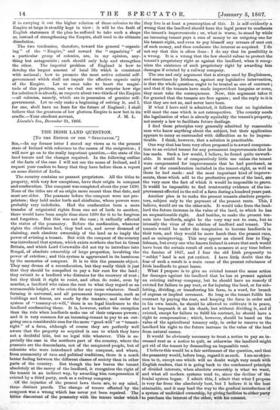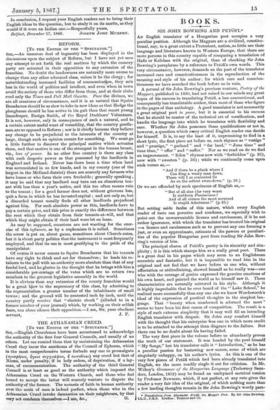THE IRISH LAND QUESTION. [To THE EDTTOR OF THE "SPECTATOR."]
Sie,—In my former letter I stated my views as to the present state of Ireland with reference to the causes of the emigration ; I will now go on to the really important question,—the state of the land tenure and the changes required. In the following outline of the facts of the case I will not use the name of Ireland, and I request your readers to fancy that they have before them a report on some district of India.
The country contains no peasant proprietors. All the titles to property, with very few exceptions, have their origin in conquest and confiscation. The conquest was completed about the year 1690. None of the titles are of an origin more recent than that date, and most are older. The peasants before the conquest were not pro- prietors; they held under lords and chieftains, whose powers were probably very indefinite. Had the confiscation been a mere transfer of seigniorial rights from one set of lords to another, there would have been ample time since 1690 for it to be forgiven and forgotten. But this was not the case ; it radically affected the status of the peasantry. Before the confiscation, whatever rights the chieftains had, they had not, and never dreamed of claiming, such absolute ownership of the land as to imply the power of evicting a tenant. But with the conquest of the country was introduced that system, which existe nowhere else but in Great Britain, and which Lord Cornwallis did not try to introduce into Bengal, of absolute ownership of large properties, involving the power of eviction ; and this system is aggravated in its harshness by the memories of conquest. It is to this the peasants object. They may dream of a reconfiscation, but they really think it just that they should be compelled to pay a fair rent for the land ; they submit to a landlord who distrains for the recovery of rent ; but they think it right to resist, and often do resist, even by murder, a landlord who raises the rent to what they regard as an unreasonable height, or who evicts for any cause whatever. Small farming is universal, and all permanent improvements, such as buildings and fences, are made by the tenants ; and under the system of "tenancy-at-will," there is no legal hindrance to the landlord confiscating these. It is, however, rather the exception than the rule when landlords make use of their extieme powers ; and it is very common for an incoming-tenant to pay to an out- going one a considerable sum for the mere "good-will" or " tenant- right " of a farm, although of course they are perfectly well aware that the property so acquired is one to which they have not a doubtful title, but no legal title whatever. This is es- pecially the case in the northern part of the country, where the peasants are the descendants, not of the conquered people, but of colonists who were introduced after the conquest, and where, from community of race and political traditions, there is a much better feeling between the different classes of society than in other parts of the country. But though the law leaves the tenant absolutely at the mercy of the landlord, it recognizes the right of the tenant in an indirect way, by awarding him compensation if evicted by a third party, such as a railway company.
Of the injustice of the present laws there are, to my mind, three distinct proofs. The change of tenure effected by the conquest was a wrong which has never yet been repaired. The bitter discontent of the peasantry with the tenure under which
they live is at least a presumption of this. It is Self-evidently a wrong that the landlord should have the legal power to confiscate the tenant's improvements ; or, what is worse, to stand by while an incoming tenant pays a sum of money to an outgoing one for his tenant-right, and even to pay himself any arrears of rent out of such money, and then confiscate the interest so acquired. I do not say that this is often done : I do say that its possibility is a wrong. It is a wrong that the law should refuse to protect the tenant's proprietary right as against the landlord, when it recog- nizes the existence of such proprietary right by awarding him damages if evicted by a railway company.
The one and only argument that is always used by Englishmen, and sometimes by Irishmen, against any legislative intervention, is that the whole question ought to be treated as one of contract; and that if the tenants have made improvident bargains or none, they must take the consequences. Now, this argument takes it for granted that the tenants are free agents ; and the reply to it is that they are not so, and never have been.
If what I have said is admitted, it follows that no legislation will meet the case which is not retrospective. The country needs the legalization of what is already equitably the tenant's property, not merely a law to facilitate future dealings.
I find these principles very generally admitted by reasonable men who know anything about the subject, but their application appears to many so surrounded with difficulties as to be imprac- ticable. I think, however, that a solution is practicable.
One way that has been very often proposed is to award compensa- tion to an evicted tenant for any permanent improvements that he has made. Such a law would, I believe, be found quite unwork- able. It would be of comparatively little use unless the tenant were compensated for improvements that he had purchased, as part of the consideration included in the tenant-right, as well as those he had made : and the most important kind of improve- ments, those which add to the productive powers of the land, are the very ones the fact of which it would be impossible to prove. It would be impossible to find trustworthy evidence of the im- provement effected in the soil of a farm during a hundred years past.
Another plan is to make the present tenants absolute proprie- tors, subject only to the payment of the present rents. This, I believe, would err on the other side. It would take from the land- lord the future increase in the value of the land, to which he has an unquestionable right. And besides, to make the present ten- ants into landlords, might be the very way not to cure, but to intensify the vices of the relation of landlord and tenant. The tenants would be under the temptation to become landlords in their turn, and they would be more harsh than the present race, and as unimproving. This may appear an absurd fear to Eng- lishmen, but every one who knows Ireland is aware that such would have been the certain result of such a measure at any time before the famine of 1847, and I fear the old Irish propensity to " sublet " land is not yet extinct. I have littlp doubt that the fear of such a result is a main cause of the present reluctance of Irish landlords to grant leases.
What I propose is to give an evicted tenant the same action for damages against his landlord that he has at present against an evicting railway company, but he should have no remedy if evicted for failure to pay rent, or for injuring the land, or for sub- letting, dividing, or transferring his farm, in a word, for breach of express or implied covenant. So long as the tenant fulfils his contract by paying the rent, and keeping the farm in order and in his own hands, he should be allowed to cultivate it in peace, and to bequeath it at his death, but without dividing it, and if evicted, except for failure to fulfil his contract, he should have a right to compensation ; which, however, should be based on the value of the agricultural tenancy only, in order to reserve to the landlord his right to the future increase in the value of the land from natural causes.
It would be obviously necessary to treat a notice to pay an in- creased rent as a notice to quit, as otherwise the landlord might get rid of the tenant by demanding an impossible rent.
I believe this would be a fair settlement of the question, and that the peasantry would, before long, regard it as such. I see no objec- tion to it, except one which will no doubt weigh very much with English readers, that it is going back to the condemned principle of divided interests, when absolute ownership is what we want, and what all modern systems tend to, since the decline of the feudal system began. I admit this, I admit that what I propose is very far from the absolutely best, but I believe it is the best attainable, and it may lead the way to the gradual introduction of a system of undivided ownership, by giving facilities to either party to purchase the interest of the other, with his consent. In conclusion, I request your English readers not to bring their English ideas to the question, but to study it on its merits, as they would if it were an Indian one.—Respectfully yours,





































 Previous page
Previous page